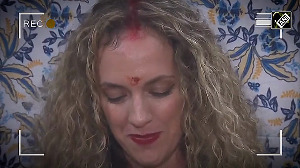Ram Sampath, 30, is part of a quiet revolution in the music-making industry, where young twenty-somethings are literally making a living on a song and a prayer, right from the cosy confines of their bedrooms. Welcome to home-grown bedroom studios, where recording music can just be a matter of rolling out of bed and pressing a button.
Time was when cutting an album or recording a jingle meant booking a fixed amount of expensive time in a well-equipped but unfamiliar room where working in solitude was considered an eccentric whim.
More recently, a younger genre of musicians and recordists are enabling music to emerge not just from acoustically perfect state-of-the-art studios, but also from set-ups tucked into bedrooms and basements, or simply programmed onto a laptop.
Along with digital recording, and increased processor speed in home computers, a virtual recording console, effects and instrumental sounds, are all tucked into software like Pro Tools -- a program introduced by Digidesign in 1991 which simulates a multitask studio capable of recording, overdubbing, mixing, editing, even tuning up missed notes or placing a sound on the beat.
Perfect for 33-year-old Indraneel Hariharan from Delhi, who carries his entire recording set-up, replete with his i-Mac G5, audio production software, and a couple of microphones with him.
"Convenience is the name of the game; I could take my recording set-up to a client, have my clients come home, or meet me in a larger studio," he says.
I have a dream. Sampath's sojourn with music began when he was just 14. By 22 he had set up his own recording studio in the privacy of his boudoir-a neat 250 sq. ft of studio space where his keyboards, sampler, Yamaha Digital Mixer, DAT (Digital Analog Tracker) machine and computer gear jostle for space with his bed and closets.
Says Sampath, "Since computers can mimic the reverberations of anything from a cubicle to a stadium, the dominance of physical space as a constraint to record great quality music has taken a backseat."
Sampath's boasts are not without merit as he has recorded Shaan's chart topper Tanha Dil as well as Kaisa Jadoo Dala Re from the Bollywood film Khakee, in his own bedroom studio. "A R Rehman recorded the soundtrack of Roja in his private bedroom studio," he argues.
Knocking on heaven's door. "The growth of home recording is a convergence of technology, thrift and entrepreneurship," says 30-year old Prem Sivaperuman, Head of the Department, School of Audio Engineering, Chennai. Sivaperuman started Decibels, his home studio in 2004, with an initial investment of Rs 3 lakh (Rs 300,000). "Investment depends on the kind of equipment you require, which has to suit your individual needs as a musician or fulfill the requirements of a formal studio in case you want to rent it out," he says.
Here's a breakdown of what you'll need for a basic home studio: A good quality microphone; a basic mixer; an audio interface for your computer; computer; Studio monitors (speakers), other sound sources, such as musical instruments, turntables or CD player (optional) and some measure of soundproofing.
All this could cost around Rs 3 lakh-4 lakh (Rs 300,000-400,000).
Once business expands, and the body and profile of work diversifies, it is expedient, if not essential, to upgrade. "Constant upgrade keeps you ahead in the game and ensures the regular flow of business and clients," says Sampath.
The good news, he feels, is that apart from a computer, where faster is better, making upgrades imperative, if you invest in timeless gear initially, then there is no urgency to upgrade year-on-year. "Neumann microphones, for example, are cutting edge and popularly used the world over," he says.
Bittersweet symphony. The initial investment may seem high to some, but it comes with short turnaround time, the creative freedom, and an interesting and talented pool of people to work with. Sampath says that proximity and contacts in the advertising circuit is the best driver of business since the advertising industry gives most of the work. "This is what makes breaking into the industry by a rank newcomer relatively simple, and eases the turnaround time to a mere six months," he adds.
However, Sivaperuman cautions that work is more easily available in movie hubs like Mumbai, Chennai and Hyderabad.
"The volume of work is larger in these cities since there are ample opportunities to record movie tracks and albums, radio spots, jingles and voiceovers for films and radio," he says. He feels that in other cities, as its spread and concentration is limited, work is tougher to come by. That slows down the returns and prolongs the gestation period for breaking even to a year.
Hope of deliverance. Whether you are a musician or a composer who plans to use the studio for personal recording or to record for others, or even if you simply want to invest in an audio studio to exploit its business potential, there is money to be made. "It's easy to earn about Rs 4 lakh a month with just about a year or two in the industry," says Sampath.
Sivaperuman pegs earnings at Rs 50,000-75,000 per month in Chennai, Hyderabad and Mumbai and between Rs 20,000 and Rs 30,000 in other cities. In case you are planning to rent out your studio, rentals vary widely between Rs 300 an hour and Rs 15,000-20,000 an hour depending on the location, city and equipment.
Says Sivaperuman, "Talent, competence and aptitude are also vital to the running of a successful recording studio and the price you can charge. If you inspire confidence with your craft, you will automatically and constantly attract a loyal clientele."
He feels a formal education in audio engineering is ideal, especially from a good school such as the School of Audio Engineering in Chennai or the Whistling Woods International Institute for Film, Television & Media Arts in Mumbai. "Lack of education can be traded only if you have at least 2-3 years of hands-on training and work experience in a good recording studio," he says.
Hariharan and Sampath, however, feel that how you market and position yourself is more important. "With passion, a ear for music and an acute knowledge of acoustics, you can run the show," says Sampath.
With its quick turnaround time and relatively easy start, home studios might just be the tune you were looking for.






 © 2025
© 2025